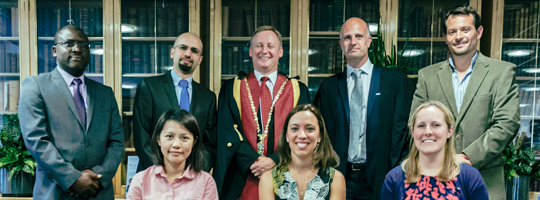-
-
-
-
-
- About extra-mural studies (EMS)
- EMS requirements
- Information for vet students
- Information for EMS providers
- Information for vet schools
- Temporary EMS requirements
- Practice by students - regulations
- Health and safety on EMS placements
- EMS contacts and further guidance
- Extra-mural studies fit for the future
-
-
- Code of Professional Conduct for Veterinary Surgeons
- Code of Professional Conduct for Veterinary Nurses
- Contact the Advice Team
- XL Bully dog ban
- 'Under care' - new guidance
- Advice on Schedule 3
- Controlled Drugs Guidance – A to Z
- Dealing with Difficult Situations webinar recordings
- FAQs – Common medicines pitfalls
- FAQs – Routine veterinary practice and clinical veterinary research
- FAQs – Advertising of practice names
- GDPR – RCVS information and Q&As
President welcomes successful exam candidates to the Register
8 August 2014
Stuart Reid, President of the RCVS, welcomed six new members to the Register at a special ceremony at Belgravia House this week, following their success in the Statutory Examination for Membership.
The registrants had qualified from universities outside of the UK that we do not currently recognise and so had to pass the exam in order to gain membership of the College and be eligible to practise in the UK.
To pass the exam, candidates must meet our English language competence requirements, take written exams and then take clinical, oral, and practical exams which, this year, were held at the Department of Veterinary Medicine at the University of Cambridge.
Of the 28 statutory membership exam candidates this year, seven passed – six of whom attended the registration ceremony on Tuesday 5 August with their family members and friends.
On welcoming them to the Register, Professor Stuart Reid praised the hard work which had got them to this stage, saying: “I know from your trials and tribulations that you have worked very hard to get to this point.
You are now part of this veterinary family and will contribute to its family life and I hope that the careers you have will be happy, enjoyable and fulfilling.”
“You have come to this point through a variety of routes and I genuinely can’t say I’ve encountered a more diverse group of individuals. You have succeeded where others have not, there are very few who have made it and so, many congratulations.”
During the short ceremony the new members made their professional declarations outlining their responsibilities to the public, their clients, the profession and the RCVS. After this, Professor Reid formally admitted them as members.
He went on to welcome the candidates to the wider ‘veterinary family’, adding: “You are now part of this veterinary family and will contribute to its family life and I hope that the careers you have will be happy, enjoyable and fulfilling.”
The candidates themselves had qualified from universities across four different continents and many have worked as veterinary surgeons in other parts of the world before becoming members of the College.
One of those who was particularly pleased with the outcome of the exams was Foong Yan Lum from Malaysia, who graduated from Putra University in 2006 and has been working as a veterinary surgeon in her home country. She said: “I am very happy and it still doesn’t feel quite real because it was difficult, but I actually passed first time.
“It was challenging and the hardest part was when I was face-to-face with the examiner answering questions because I wasn’t sure I was answering the questions correctly. So I was delighted when I was told that I had passed and was having nightmares even before I came here – I kept checking my emails to make sure it was real!”
Another successful candidate who was looking forward to starting his career as a veterinary surgeon in the UK was Reza Sadeghi, a 2006 graduate of Azad University in Iran. Mr Sadeghi had been working in an administrative role at a veterinary hospital in north London and, following his registration, intended to go straight into practice.
He said: “It was a very hard and, at times, frustrating process and in total it has taken me three years to pass the examination, but I am very happy to now be a member of the Royal College of Veterinary Surgeons. I’ve had the privilege of working at the hospital while I’ve studied which has helped me a lot. I’ll be talking to my bosses at the hospital and hopefully they will take me on as a veterinary surgeon.”
View all the photos from the ceremony on our Flickr photostream.
